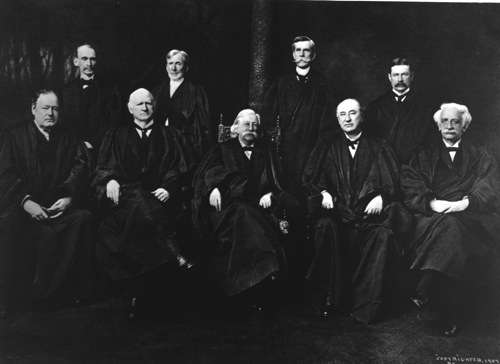The Volokh Conspiracy
Mostly law professors | Sometimes contrarian | Often libertarian | Always independent
Today in Supreme Court History: December 2, 1907
Editor's Note: We invite comments and request that they be civil and on-topic. We do not moderate or assume any responsibility for comments, which are owned by the readers who post them. Comments do not represent the views of Reason.com or Reason Foundation. We reserve the right to delete any comment for any reason at any time. Comments may only be edited within 5 minutes of posting. Report abuses.
Please to post comments



United States v. Stapf, 375 U.S. 118 (decided December 2, 1963): estate not entitled to marital tax deduction where will required widow’s share to be transferred to children
United States v. Powell, 423 U.S. 87 (decided December 2, 1975): 18 U.S.C. §1715, criminalizing mailing of concealed-carry-capable weapons to general public (for example, defendant’s 22-inch sawed-off shotgun), was not unconstitutionally vague (so far as I know, this statute survives Heller and McDonald)
United States v. Jose, 519 U.S. 54 (decided December 2, 1996): order enforcing IRS summons but requiring IRS to give five days’ notice to taxpayer before forwarding produced documents to its criminal division was “final order” and therefore appealable
The link to Ex Parte Young is interesting, and the decision is a bit odd. It involves both the Eleventh and Fourteenth Amendments and says a citizen of another state can sue an official for enforcing an unconstitutional law even though you can't sue the state itself under the Eleventh Amendment.
Harlan wasn't convinced and was the lone dissenter.
It’s a legal fiction and a clear violation of the 11A.
The 11A was passed in a hurry in a young nation panicked by the Supremacy Clause and the Court’s original jurisdiction actually being put into practice.
The thing which convinced me the opinion was wrong was...reading the opinion. Looking at all the knots they twisted themselves into in order to reach their end result, I figured there must be something wrong with their position. Harlan's dissent emphasized the weaknesses of the majority position.
Protecting states from suit in federal court is unjust, but the injustice is so unambiguous that it might have been better to simply accept the situation rather than using dubious reasoning to carve out exceptions.
Update: I forgot about the 11A being limited to diversity jurisdiction. It doesn't mention federal constitutional cases. So I guess a citizen is left free to sue his own state, but for the fact that the Supreme Court has extended some "invisible radiation" from the 11A.
True! I forgot too
I don't think it's a violation of the 11th Amendment. The 11th Amendment means exactly what it says and no more than what it says- it means a citizen of one state can't sue a different state. It was a reaction to a SCOTUS decision (Chisolm v. Georgia) that held that this was permissible.
Basically everything from Hans v. Louisiana on forward on this issue is just a bunch of people who hate the notion that federal courts can order state governments to pay damages lying and saying that's actually prohibited by the Constitution when it isn't.